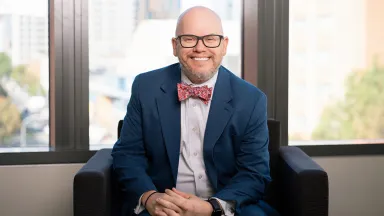
Freshmen Impress in LeBow's Shark Tank
The buzz at the fifth annual Six Minute Pitch competition was uncommon for 9:30 a.m. on a Saturday. Throughout the first two floors of Gerri C. LeBow Hall, competing freshmen stole a few moments before keynote speaker Wayne Kimmel’s address for last minute rehearsals and final tweaks to their upcoming pitches. When Mr. Kimmel, a managing partner of venture capital firm Seventy Six Capital, took the stage and shared his insights on networking and making the connections that can move your dreams to reality, everyone was attentive and clearly energized.
After speaking with some of the students set to pitch their ideas, Mr. Kimmel shared his thoughts on the morning’s event: “I believe that this type of ‘Shark Tank’ competition is a tremendous way for students to learn about business and truly demystify the world of entrepreneurship. This is a great and safe way to practice and learn about how to start a company.”
To begin, the student groups were assigned to presentation rooms where judges made up of young alumni, LeBow professors and international faculty (via Skype) waited to hear their pitches. The judges took in the presentations, asked tough questions and provided each group with feedback.
When it came time to choose one idea that would advance to the finals, the judges acknowledged how hard it would be to choose. The teams in the Six Minute Pitch gained entry by being chosen as the top group in each section of BUSN101. The judges’ deliberations confirmed that the field was full of strong ideas. After some vigorous debate, finalists were chosen and Chris Finnin, LeBow’s director of general business studies and the morning’s emcee, announced the results. The five surviving teams quickly regrouped and presented again for the judges.
The day’s big winners, pitching a product they’d named Orbis, utilized a dramatic entrance to get the judges’ attention. Rachael Brink playing it straight by beginning the presentation alone only to have Matthew DelBaggio storm in the room apologizing profusely that his phone had died and he had lost track of time. The gag worked perfectly to illustrate the importance of their product, a phone case that creates a charge using kinetic energy.
The choice of product and presentation, were a part of the Orbis team’s winning strategy. Rachael explains, “We chose to create a phone charger because we felt that phones running out of battery was a relevant problem to people all over the world. The best way to win a competition like this is to create a product that the judges could envision themselves using and creatively present it.”
The technique worked and sealed their victory in a top three that also included Beauty Truck, a mobile manicure station, and UBand, a wearable student ID.



